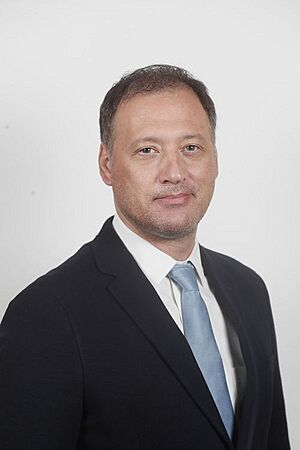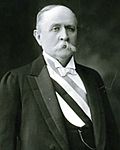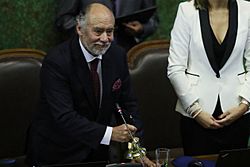President of the Chamber of Deputies of Chile facts for kids
Quick facts for kids President of theChamber of Deputies of Chile |
|
|---|---|

|
|
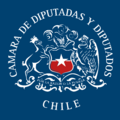
Emblem of the Chamber of Deputies of Chile
|
|
| Chamber of Deputies of Chile | |
| Style | His Excellency The Honorable |
| Seat | National Congress of Chile, Valparaíso |
| Nominator | Political parties |
| Appointer | Chamber of Deputies of Chile |
| Term length | One legislative year |
| Constituting instrument | Constitution of Chile |
| Formation | July 4, 1811 |
| First holder | Juan Antonio Ovalle |
| Deputy | First Vice President of the Chamber of Deputies Second Vice President of the Chamber of Deputies |
| Salary | US$133,282 CLP$112,198,212 |
| Website | Official website: http://www.camara.cl/ |
The President of the Chamber of Deputies of Chile (in Spanish: Presidente de la Cámara de Diputadas y Diputados de la República de Chile) is the main leader of the Chamber of Deputies of Chile. This important role was created in 1811 by Chile's First National Congress.
This position is part of the line of succession for the presidency of Chile. It comes after the ministers of State and the president of the Senate of Chile. This order is set by the Constitution (Article 29).
Currently, José Miguel Castro from the National Renewal (RN) party holds this office. He became president on April 7, 2025, after Karol Cariola resigned.
Contents
How the President of the Chamber is Chosen
The leaders of the Chamber of Deputies of Chile include a president, a first vice president, and a second vice president. These three people are chosen by a majority vote in a public election.
The president and vice presidents can be re-elected to their positions.
If the president of the Chamber resigns and the Chamber of Deputies accepts it, a new election is held. This election takes place 45 hours after the position becomes empty.
A Look at the History of the Presidency
Early Years: 1810–1814
The very first president of the Chamber of Deputies of Chile was Juan Antonio Ovalle. He was a lawyer and landowner. He was elected as a deputy for Santiago and became president of the First National Congress of Chile.
He served for 16 days before Martín Calvo Encalada took over.
On September 4, 1811, José Miguel Carrera led a revolution with his family's help. They wanted to create a more radical government. Joaquín Larraín, who helped with the revolution, became the new president of the Chamber.
Later, José Miguel Carrera ordered the Congress to close on December 2.
Congress was brought back in 1812, but it only had the Senate of Chile. This Senate stopped existing in 1814 after Chile lost the Battle of Rancagua.
New Nation: 1817–1823
Supreme Director Bernardo O'Higgins brought Congress back in 1818. It was a single legislative body, the Senate of Chile. A system with two parts (a Senate and a Chamber of Deputies) was planned in 1822.
However, this two-part system could not be started. This was because of political problems in the country. These problems followed O'Higgins' resignation in 1823.
A new constitution was written in 1823 during the time of Supreme Director Ramón Freire. This constitution created a single legislative body, the Senate of Chile.
The Chilean Civil War of 1891
By 1891, disagreements between the government and the Congress led to a war. Congress wanted to remove the government that was in power.
Ramón Barros Luco, who was president of the Chamber, signed a document to remove President José Manuel Balmaceda. This caused the Chilean Navy to rebel and support Congress.
Barros Luco was part of the group that managed parts of the country controlled by Congress during the war. After Congress won, Barros Luco helped oversee new elections.
Military Rule: 1973–1990
Congress was closed after the 1973 coup d'état. This event removed President Salvador Allende from power. A military junta led by General Augusto Pinochet took control.
Luis Pareto was the last president of the Chamber of Deputies before Congress was dissolved. He supported an agreement from August 23, 1973. This agreement accused Allende's government of trying to create a totalitarian system.
Return to Democracy: 1990–Present
Congress was brought back in March 1990 as Chile returned to democracy. Elections for president and parliament were held in December 1989.
María Maluenda, a supporter of human rights and former ambassador, was the temporary president of the Chamber. She served during its first meeting before José Antonio Viera-Gallo was elected.
In 2008, Juan Bustos, who was president of the Chamber, passed away. President Michelle Bachelet declared three days of national mourning. Guillermo Ceroni, the First Vice President, served as temporary president for a week. Then, Francisco Encina was elected.
In November 2019, some deputies asked Iván Flores, the president at the time, to resign. This was because he decided to stop activities for a day during the 2019–2020 Chilean protests. They felt this hurt the image of Congress. Later that month, protestors threw rocks at Flores' office in Valparaíso.
In April 2020, Diego Paulsen became the youngest person to hold the position. He was 32 years old.
What the President Does
The president's main job is to lead the Chamber and keep order. If there is disorder, the president can ask people to leave. They can also ask for help from the Carabineros (Chilean police) to restore order.
The president of the Chamber can also say that certain bills or constitutional reforms are not allowed. This happens if they go against Article 65 of the Constitution of Chile. This article states that only the president of Chile can suggest changes to the country's political, administrative, or financial divisions.
How to Address the President
The president of the Chamber of Deputies is formally called "His Excellency". This title is used in official documents. All members of the Chamber of Deputies, including the president, are also called "The Honorable".
The president should be referred to in the third person, just like other members of the Chamber.
Presidents of the Chamber of Deputies of Chile
Presidential Republic (1990–present)
| No. | Portrait | Name (Birth–Death) |
Term of office | Party | ||
|---|---|---|---|---|---|---|
| 1 | 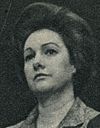 |
María Maluenda (1920–2011) |
11 March 1990 | 11 March 1990 | Party for Democracy | |
| 2 | 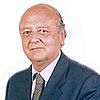 |
José Antonio Viera-Gallo (born 1943) |
11 March 1990 | 21 July 1993 | Party for Democracy | |
| 3 | 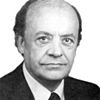 |
Jorge Molina Valdivieso (born 1932) |
21 July 1993 | 11 March 1994 | Party for Democracy | |
| 4 | 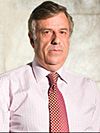 |
Jorge Schaulsohn (born 1952) |
11 March 1994 | 3 November 1994 | Party for Democracy | |
| 5 | 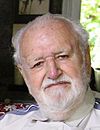 |
Vicente Sota (1924–2017) |
3 November 1994 | 14 March 1995 | Party for Democracy | |
| 6 | 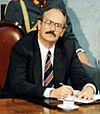 |
Jaime Estévez (born 1946) |
14 March 1995 | 19 November 1996 | Socialist Party | |
| 7 | 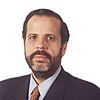 |
Gutenberg Martínez (born 1950) |
19 November 1996 | 11 March 1999 | Christian Democratic Party | |
| 8 | 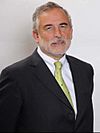 |
Carlos Montes (born 1946) |
11 March 1999 | 22 March 2000 | Socialist Party | |
| 9 | 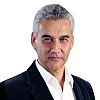 |
Víctor Barrueto (born 1953) |
22 March 2000 | 3 March 2001 | Party for Democracy | |
| 10 | 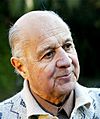 |
Luis Pareto (1928–2022) |
3 March 2001 | 11 March 2002 | Christian Democratic Party | |
| 11 | 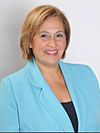 |
Adriana Muñoz (born 1948) |
11 March 2002 | 13 March 2003 | Party for Democracy | |
| 12 | 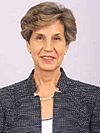 |
Isabel Allende Bussi (born 1945) |
13 March 2003 | 16 March 2004 | Socialist Party | |
| 13 | 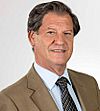 |
Pablo Lorenzini (1949–2025) |
16 March 2004 | 6 January 2005 | Christian Democratic Party | |
| 14 | 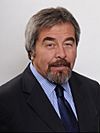 |
Gabriel Ascencio (born 1953) |
6 January 2005 | 11 March 2006 | Christian Democratic Party | |
| 15 | 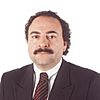 |
Antonio Leal (1950–2021) |
11 March 2006 | 20 March 2007 | Party for Democracy | |
| 16 | 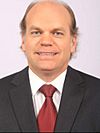 |
Patricio Walker (born 1969) |
20 March 2007 | 13 March 2008 | Christian Democratic Party | |
| 17 | 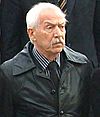 |
Juan Bustos (1935–2008) |
13 March 2008 | 7 August 2008 | Socialist Party | |
| 18 | 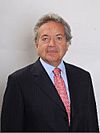 |
Guillermo Ceroni (born 1946) |
7 August 2008 | 14 August 2008 | Party for Democracy | |
| 19 | 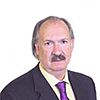 |
Francisco Encina (born 1943) |
14 August 2008 | 18 March 2009 | Socialist Party | |
| 20 | 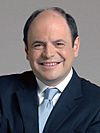 |
Rodrigo Álvarez (born 1966) |
18 March 2009 | 11 March 2010 | Independent Democratic Union | |
| 21 | 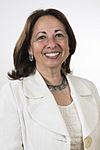 |
Alejandra Sepúlveda (born 1965) |
11 March 2010 | 15 March 2011 | Independent Regionalist Party | |
| 22 | 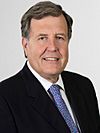 |
Patricio Melero (born 1956) |
15 March 2011 | 20 March 2012 | Independent Democratic Union | |
| 23 | 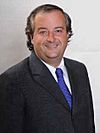 |
Nicolás Monckeberg (born 1973) |
20 March 2012 | 3 April 2013 | National Renewal | |
| 24 | 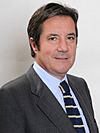 |
Edmundo Eluchans (born 1950) |
3 April 2013 | 11 March 2014 | Independent Democratic Union | |
| 25 | 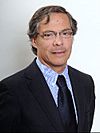 |
Aldo Cornejo (born 1955) |
11 March 2014 | 17 March 2015 | Christian Democratic Party | |
| 26 | 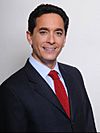 |
Marco Antonio Núñez (born 1966) |
17 March 2015 | 22 March 2016 | Party for Democracy | |
| 27 | 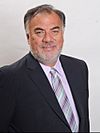 |
Osvaldo Andrade (born 1953) |
22 March 2016 | 22 March 2017 | Socialist Party | |
| 28 | 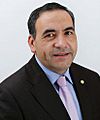 |
Fidel Espinoza (born 1970) |
22 March 2017 | 11 March 2018 | Socialist Party | |
| 29 | 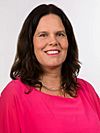 |
Maya Fernández (born 1971) |
11 March 2018 | 19 March 2019 | Socialist Party | |
| 30 |  |
Iván Flores (born 1955) |
19 March 2019 | 7 April 2020 | Christian Democratic Party | |
| 31 | 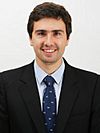 |
Diego Paulsen (born 1987) |
7 April 2020 | 11 March 2022 | National Renewal | |
| 32 | 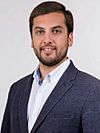 |
Raúl Soto (born 1987) |
11 March 2022 | 7 November 2022 | Party for Democracy | |
| 33 | 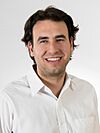 |
Vlado Mirosevic (born 1987) |
7 November 2022 | 24 July 2023 | Liberal Party | |
| 34 |  |
Ricardo Cifuentes (born 1962) |
24 July 2023 | 15 April 2024 | Christian Democratic Party | |
| 35 |  |
Karol Cariola (born 1987) |
15 April 2024 | 24 March 2025 | Communist Party of Chile | |
| 36 |  |
José Miguel Castro (born 1974) |
7 April 2025 | Incumbent | National Renewal | |
Timeline of Presidents
Presidential Republic (1990–present)
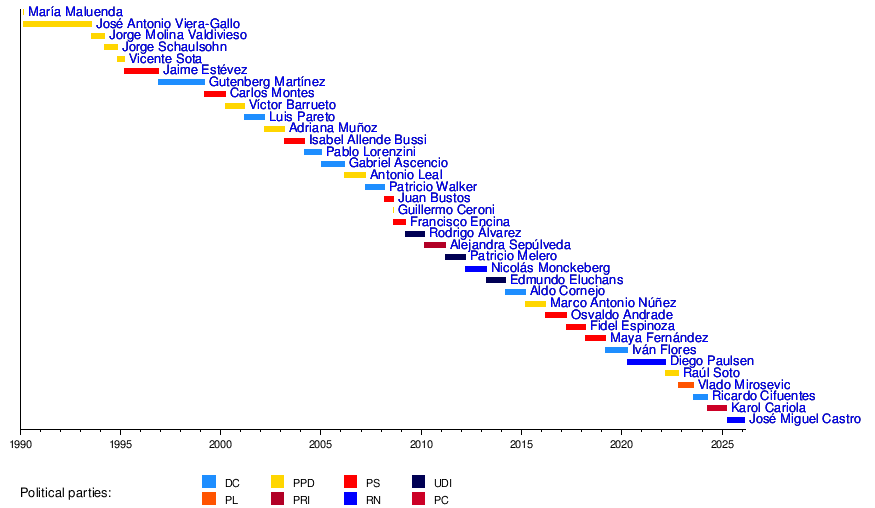
See also
 In Spanish: Presidente de la Cámara de Diputadas y Diputados de Chile para niños
In Spanish: Presidente de la Cámara de Diputadas y Diputados de Chile para niños
 | Chris Smalls |
 | Fred Hampton |
 | Ralph Abernathy |


